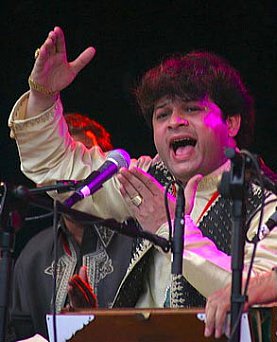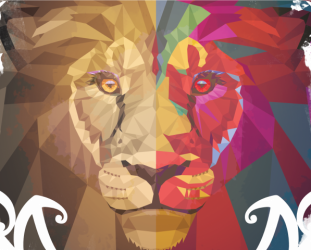Graham Reid | | 3 min read

Interviewing Sufi qawwali singer Asif Ali Khan at the recent Womad Taranaki was an experience. Not only does he arrive in the small porta-cabin at the side of one of the stages but so does the whole eight-man ensemble and their voluble French manager, the wonderfully named Wowkonowicz Snafu.
We crammed into the tiny space and as I tried to speak with Asif – all the while being filmed on an iPad which was passed between various band members to get multiple angles on our conversation – matters were made difficult by him saying immediately he spoke little English, and then being diverted to some paperwork he suddenly seemed to need to read.
What we call a snafu, I guess.
Anyway it was fun if not enlightening – they had delivered one of the defining moments of the festival for me with a thrilling performance – and I started by asking about Sufism as an intellectual branch of Islam and a philosophy. Through a translator (one of the band's singers) he got my questions and first thanked New Zealand people and the Womad team.

I noted that I knew people who studied Sufism but weren't Muslim, and asked if it were possible to take on just the philosophical aspects of Sufism without embracing Islam.
At this point Mr Snafu leaped to his feet and said he was a Christian from France and he studied Sufism.
“Sufi is very open minded and an open door for everyone to connect with the spirit and to share that. I have been visiting Pakistan for 10 years and everywhere people are very open, these are peaceful people. And don't make these things about Islam is this or that.
“Of course Sufism is a branch of Islam, but it is very slow and soft.”
So if it is an area of intellectual improvement, where does qawwali fit in? Is it to get people into that intellectual space?
Asif answered that is what qawwali does but then the translator took over and added his bit about the Sufi/Islam question.
“Sufi comes from the entire world generation. It comes from everywhere. We give the message of love and peace through qawwali and this is because of Sufism. So if you are transforming your love and good things to the next generation you are following Sufism.
“Sufism takes you to an intellectual connection to each other.”
But qawwali is the vehicle which allows
the faithful to reach this level?
“Exactly, you have answered
your question yourself. It doesn't matter if someone is bad or good
but if he wants to come into the circle of Sufism then he can come.
It takes the bad place person to a good place.”
Things started to go a bit wonky after this when I asked about Nusrat Fateh Ali Khan, the greatest of qawwali singers and a teacher of Asif. I said that when I first heard Nusrat I heard a magnificent voice full of emotion and power, but I wanted to know what people in Pakistan and Sufis in particular heard that I, as an outsider, could not.
Asif answered at length and our translator – whom I started to guess might be Asif's brother – told me he said that while Nusrat helped get Sufism and qawwali to people in Europe and the western world there had been so many others who had been serving Sufism before . . . like his father Fateh Ali Khan – who was sitting opposite me – and his own grandfather who had served qawwali for more than 75 years.
“So he was more than 110 when he passed away, and his father came into this field and served qawwali more than 50 years and then we joined and Asif became the student of Nusrat and he also received the training from his father as well.
“So the families which are serving the music are called gharana, so many people have been serving qawwali. So we are having the next generation involved in this. They have their jobs but they are practicing qawwali and this is how it carries on. Through our nephews and sons and small kids, we are training them for Sufism and especially the qawwali just to give that message of love and peace.”
For more details on Womad 2014 artists with sound samples and Elsewhere's opinion simply go here.
.







post a comment